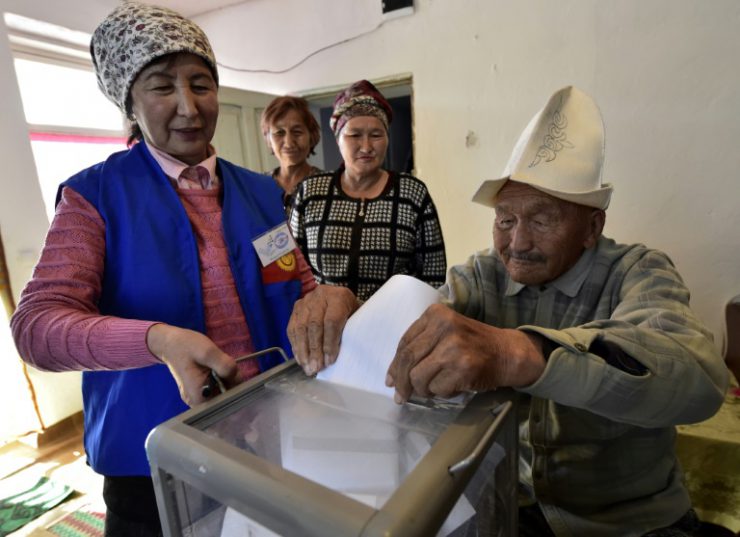Karezza is the slow food of sex
Kyrgyz President Almazbek Atambayev's chosen successor Sooronbai Jeenbekov won a presidential election on Sunday, defying predictions of a second round and instability in the Central Asian nation.
The Central Election Commission said former prime minister Jeenbekov had pulled in over 54 percent of the vote, with oligarch opponent Omurbek Babanov taking more than a third of the ballot.
“Jeenbekov is leading,” CEC head Nurzhan Shayldabekova told reporters in the capital Bishkek, saying 97 percent of the ballots had been counted.
“The elections can be considered valid. The remaining three percent of ballots will not change the overall picture.”
The CEC said turnout was around 56 percent.
Addressing cheering supporters at his campaign headquarters in Bishkek, Jeenbekov said Kyrgyzstan “had shown the whole world that we are a democratic and sovereign state, that only the people of Kyrgyzstan decide the country’s destiny.
“I am grateful to my opponents who …made the elections competitive,” he said.
However, there was no sign that Babanov had accepted the outcome with a campaign spokeswoman telling AFP they were conducting “a parallel count”.
Resource-poor Kyrgyzstan, which looks to Russia for political support and China for investment is often described as the most democratic state in Central Asia, a predominantly authoritarian region.

Around 24% of the electorate cast their ballots in the first six hours, with some older people voting at home such as this man in Arashan village just outside the Kyrgyz capital, Bishkek
But pre-election campaigning was overshadowed by an apparent smear campaign against Babanov, who leads the parliament’s second largest party, and suspicions that Jeenbekov could benefit from government patronage.
Jeenbekov is a close ally of incumbent president Atambayev, 61, who chose to respect a single, six-year presidential term and step down.
Atambayev’s own election in 2011 came on the back of political and ethnic violence the year before that left hundreds dead.
– Tensions during run-up –
The country saw its first two presidents — autocrats Askar Akayev and Kurmanbek Bakiyev — overthrown in 2005 and 2010 respectively.
Sunday’s election featuring 11 candidates promised to see the first peaceful transfer of power between two elected presidents but the build up to the vote was beset by tensions.
Visible government pressure on the defeated Babanov and his supporters cast a cloud over the vote.
One of Babanov’s main supporters was arrested in the poll run up on coup plotting charges and he was depicted by pro-government media as a pawn of neighbouring Kazakhstan after appearing to win an endorsement from its 77-year-old autocrat Nursultan Nazarbayev.
Kyrgyzstan is a landlocked country of some six million people which is almost entirely covered by mountains
The country’s state prosecutor also said it was investigating comments made by Babanov on the campaign trail for inciting inter-ethnic hatred.
Several voters told AFP on election day they believed Babanov would look to foment unrest if he lost, a claim that was strongly promoted by pro-government media.
“I will vote for anyone apart from that Babanov,” said Asiya Muratova, a 37-year-old teacher from Bishkek.
“I have heard for some time that he is preparing unrest in the event he loses,” she told AFP.
The candidate repeatedly said that allegations made against him and his campaign by pro-government media were false and accused security services of preparing “provocations” against him on Sunday.
Regional factors also appeared to play a role in a vote overwhelmingly counted by automatic machines.
CEC data showed that northerner Babanov won the vote in the northern Chui and Talas regions but was thoroughly beaten by Jeenbekov in the populous southern region of Osh.
Regional factors appeared to play a role in the Kyrgyz vote overwhelmingly counted by automatic machines
Just over three million Kyrgyz nationals were eligible to vote in Sunday’s election.
But hundreds of thousands of migrants working abroad in Russia could not vote because they did not submit biometric data in time.
Download our app